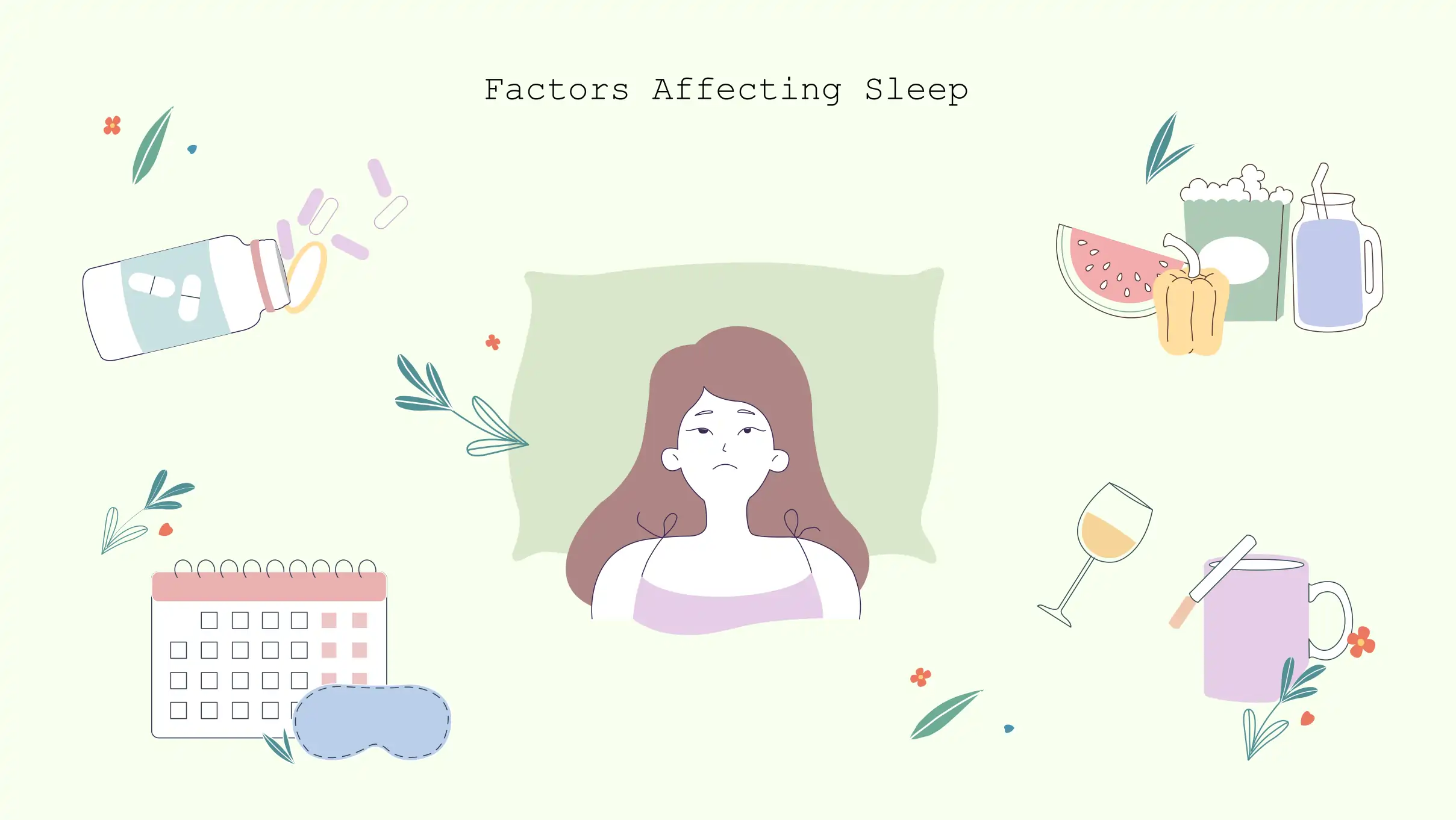16 Factors Affecting Your Sleep & Strategies To Promote Better Sleep
Written by

Medical reviewed by


Table Of Content
More than you enjoy the quality sleeping time, do you toss and turn throughout the night? Does falling asleep feel like a taxing chore? Well, there may be a few factors affecting your sleep, either knowingly or unknowingly! In this article, we are here to tell you all about what factors affect sleep so you can combat these factors and achieve a peaceful slumber. Read ahead!
1. Lights
What do you do before you hit the sheets? Most commonly, we tend to switch off the lights and make the atmosphere cosy! This is because lights can be one of the external factors affecting your sleep.
Our bodies come with an internal clock called circadian rhythm, which follows a 24-hour cycle influenced by light. In earlier days, before the invention of light bulbs, our bodies were affected by the sunlight during the day and the darkness after sunset. But today, we have the advantage of electricity by our side. This means our bodies are exposed to light even during the late evenings, delaying our internal rhythm.
And exposure to light as we sleep can disturb our internal clock. So, you can reduce the lighting a couple of hours before you make your way to bed and sleep with the lights off.
2. Caffeine
Caffeine, found in various common products, is an effective stimulant that can potentially impact your sleep. When you consume caffeinated products such as coffee, tea, energy drinks, soda, or chocolate, it stimulates alertness within approximately 30 to 60 minutes. However, it takes about 5-6 hours for your body to eliminate half of the caffeine’s effects, and the remaining half can linger for up to 10 hours before being fully metabolised.
Consuming caffeine-containing products in the late evening can interfere with your sleep cycle, making it difficult to fall asleep quickly. To promote better sleep, it is advisable to avoid consuming caffeine after 11 AM, particularly if you experience challenges in achieving a deep slumber within a few minutes. It’s worth noting that caffeine can vary in potency depending on the product and serving size, so it’s important to be mindful of your overall caffeine intake throughout the day.
3. Smoking
If you have a habit of smoking cigarettes, nicotine can be a factor affecting your sleep. In fact, it can also lead to other sleep disorders, such as sleep apnea. Besides, nicotine is a stimulant, hiding any exhaustion you may be undergoing, and it can make you feel more alert. The only solution here is to quit smoking because there are other unpleasant effects associated with this habit.
People who have recently quit smoking may experience withdrawal symptoms at night, which may hamper sleep. You can speak with your healthcare practitioner for medication.
4. Jet Lag and Shift Work
You can notice disturbances in your sleep cycle when there are changes in your exposure to light due to jet lag or shift work. These factors affecting your sleep cannot be eliminated, but with the help of prescription medications or relaxing techniques, you will be able to tackle the issue. Some of these relaxing techniques include;
- Eat light and healthy
- You can try taking a hot relaxing bath before the bedtime
- Keep yourself hydrated
- Exercise
- Try taking melatonin
5. Anxiety
Anxiety is usually associated with sleeping problems. So, if you suffer from severe anxiety and are facing difficulties falling asleep, stress may be one of the factors affecting your sleep. Now, worrying too much or having an underlying fear about things makes it harder for you to fall asleep. And being sleep-deprived can worsen your anxiety. It is like a vicious cycle where one leads to another.
To combat this external factor affecting your sleep, getting help for your anxiety is essential. Some of the things you can try include;
- Meditation
- Journaling
- Stay away from alcohol or tobacco
- Limit your caffeine intake
- Speak to a therapist
6. Marijuana
Weed or marijuana can be one of the factors affecting your sleep. In fact, a study found that people who used cannabis or had a history with one found it difficult to fall asleep and complete an entire sleep cycle. Some users also reported experiencing non-restorative sleep and went through daytime sleepiness.
7. Sleeping pills
If you regularly depend on sleeping pills to drift off to a wonderful slumber but cannot do so, it may affect your sleep. But unfortunately, sleep medications don’t receive the same therapeutic benefits as you would with falling asleep naturally.
It is also researched that people who had trouble falling asleep even after consuming sleeping pills may suffer from undiagnosed sleep apnea. This sleep disorder causes you to stop breathing for a while when you are asleep.
8. Special Diet
You already know how essential proper nutrition is for your overall health and sleep. If your body doesn’t get them, it can affect your sleep.
One study showed a correlation between Vitamin D and sleep, as Vitamin D deficiency could lead to poor sleep quality. Therefore, a balanced meal is always important.
9. Sleep Environment
An uncomfortable sleep environment can be one of the main factors affecting your sleep. This can include temperature, light, bed, noise, and electronics. For instance, some people like the environment to be cool, while some enjoy the warmth. So, make sure your sleep environment is as per your liking. To make things easier, you can always prepare ahead of time. For instance, if you are a hot sleeper who finds it difficult to achieve sound sleep due to the heat, you can always switch on the AC a few minutes before hitting the sheets.
One of the reasons why we enjoy optimal quality sleep is because of our mattresses. The cosy cushiony comfort they offer feels like a warm embrace that just helps you achieve a good night’s rest. Therefore, if your mattress has become too old and is lumpy, it can be the factor affecting your sleep as it doesn’t offer you the comfort you want.
The Instagram reels or your Facebook feed can feel a lot more interesting right before bed but this can be a factor affecting your sleep. Your phone or computer is notorious for emitting blue light. And, what does this blue light do? It restricts melatonin production, which is a sleep hormone crucial for sound sleep. Therefore, keep your phones and tabs aside at least an hour before you hit the sheets so it doesn’t affect your sleep!
10. Irregular Sleep schedule
An irregular bedtime routine is one of the prevalent problems today. This can be because of work commitments or the lifestyle you lead. However, it can be a factor affecting your sleep. When you don’t sleep and wake up at a set time, it messes with your internal system and can cause daytime sleepiness and fatigue. This can even adversely affect your mood and can affect your sleep.
11. Medication
Sleepless nights are no fun and one of the factors affecting your sleep may be the medications you are taking. For instance, antidepressants and beta blockers can hamper your sleep. So if that’s the case, it’s best to talk to your healthcare provider to suggest an alternative medication or to reduce your medication dose. In fact, you can also talk to them about taking melatonin along with them for sound sleep.
12. Snoring
Snoring can be a factor affecting your sleep. If your sleep partner snores rather loudly, it can disturb your sleep or make it difficult for you to fall asleep. In such cases, you can try;
- Wear earplugs
- Listen to white noise
- Ask your partner to change position to reduce snoring
- You can sleep in a different room
- You can go to bed earlier, so you are already in a deep state of sleep before your partner starts snoring
13. Sleep Disorders
Some sleep disorders make it very hard for you to fall asleep. For instance, insomnia, can be a factor affecting your sleep. Today, there are more than 80 types of sleep disorders, such as sleep apnea, restless leg syndrome, and more. So, if difficulty falling asleep is a recurring problem, it is always best to consult your doctor so they will help you understand the causes of sleep disorders and also rectify them.
14. Alcohol
Alcohol before bed can be one of the factors affecting your sleep. Drinking alcohol can adversely affect your internal clock aka circadian rhythm. It also curbs the production of melatonin or the sleep hormone, which is essential for a deep snooze. Finally, it reduces REM sleep. Hence, it’s always best to avoid alcohol before sleep.
15. Aches and Pains
There can be several reasons for body aches and pain. It can be because your muscles are inflamed or it can also be because of stress. If body aches and pains are keeping you from enjoying a good night’s sleep and it is a recurring problem then it is imperative to see a doctor to correct this factor affecting your sleep. With the right treatment, you will be able to enjoy a sound sleep.
16. Sleeping with Pets
Sleeping with pets can have both benefits and drawbacks for your sleep. While it can provide comfort and emotional support, there are potential issues to consider. Pets may disrupt sleep by moving around, snoring, or taking up space. Allergies to pet dander can also cause discomfort. To mitigate these drawbacks, establish boundaries, provide pets with their own sleeping area, and consider regular grooming and cleaning to minimise allergens. Assess your sleep preferences and needs when deciding whether to sleep with pets.
Tips to get better sleep
Now that you are well aware of all the factors affecting your sleep, let’s move on to some easy-peasy tips that can offer you sound sleep.
- Try to relax before bed so you don’t overthink as it can hamper your sleep
- Always stick to a regular sleep schedule
- Be mindful of using electronic devices before bed
- Don’t let stress get in the way of sleep, so you can always try meditation before bed
- Watch what you eat and drink before bed
- Try melatonin supplements after you consult with your doctor
Conclusion
Sleep is essential as it keeps your health in check and ensures you have a productive day ahead. Now that you know about all the factors affecting your sleep, make sure you take care of it right away.
Happy Sleeping!
FAQs
What are the factors that affect the quality of sleep for humans?
To take a look at all the factors affecting your sleep, take a look at the above article where we have given you all the details.
What causes poor quality of sleep?
Some of the reasons that cause poor sleep quality include;
- Consumption of alcohol before bed
- Too much caffeine
- Unhealthy lifestyle
- Sleep disorders
- Anxiety or stress
How does stress affect sleep?
When you feel extremely stressed, you tend to overthink and it also leads to deregulation of the sleep-wake cycle. Therefore, always try to put yourself in a relaxed state for sound sleep.
people like this article
Written by

Medical reviewed by






